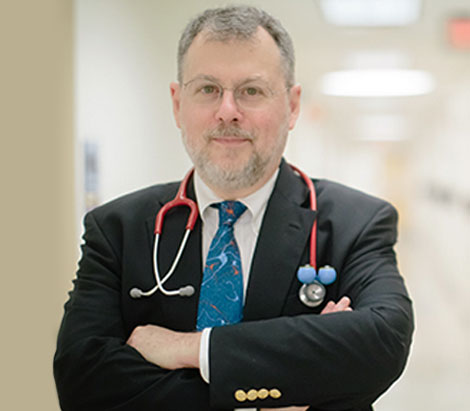Meet the Editor

Michael Morgan Dowling, MD, PhD, MSCS, FAHA, FAAN
Associate Professor of Pediatrics and Neurology
University of Texas Southwestern Medical Center and Children’s Health
Dallas, Texas
Greetings, pediatric stroke community! Our community is so international and diverse in space and specialty, that we wanted to create a forum to enhance the community that has brought together so many talented people from all over the world.
For me, my interests in neurosciences started in high school where I was able to work on a research project with Dr. Andrew Zimmerman and met a brother and sister with the then named Hallervorden-Spatz Syndrome. Later, it was picking up calf brains from the slaughterhouse on my moped for Dr. Ken Kosik in college and hours in the cold room with microtubule associated proteins. Then, in grad school where I was a fly-on-the-wall lucky to see basic science at its Nobel Prize winning best with Martin Chalife, Eric Kandel, Richard Axel, and Linda Buck. My dissertation was on the cranial nerve we never test, number one, cloning and characterizing olfactory receptors.
My neuroscience interest kept blossoming while witnessing the neuroanatomical localizing power of my great clinical mentor Dr. John Brust at Harlem Hospital. He would never allow even a neurosurgical attending physician to “skip to the MRI” before clinically “localizing the lesion”. I met Dr. Darryl de Vivo and saw a happy child run awkwardly down the hallway with a leap into his arms….and found MELAS, medicine, and biochemistry with the same pain and loss of adult neurology but with the added joy and resilience of the pediatric patient and the love and support of their families. Pediatric Neurology it was to be. I moved to the great state of Texas with Dr. Steve Roach, one of the founding fathers of the pediatric stroke community. As a new attending, I inherited his stroke patients. I reached out to the International Pediatric Stroke Study and found the 3 graces of the pediatric stroke community, Drs Gabrielle deVeber, Rebecca Ichord, and Fenella Kirkham, and was welcomed with open arms to a supportive dynamic community. I was hooked.
What I learned in high school from Dr. Zimmerman was the thrill of the “hypothesis of the day” he had on the white board…almost always wrong but stimulating greater thought and understanding. Analysis of new data with Axel was done with a shot of caffeine and the emphasis was on new approaches, new models, and new hypotheses. It was the same in discussions at Fenella’s house (she like Gabrielle and Becky deserve first name fame) with her most gracious husband serving her visiting neuro hangers-on breakfast and sometimes then lunch while the talking continued and observations were projected forward into hypotheses. (Oh, to travel post pandemic and see all these people again).
This is what I would like to create with Pediatric Stroke: A forum to share results, clinical and scientific observations, ideas, and medical hypotheses of interest to the diverse group of neuroscientists, neurologists, neurosurgeons, neuroradiologists, hematologists, cardiologists, ICU doctors, physical medicine and rehabilitation physicians, therapists, neuropsychologists, and others in our community. I hope we can collect and share what we have learned from our best mentors: our patients and colleagues. We will publish the cases that have educated and informed us, discuss how we resolved the clinical questions in troubling cases, and review the knowledge we have gained from our peers. We want informative cases, not necessarily the firsts or the “onlys” but the ones we shouldn’t miss and, once seen, never forget. We need to share what Becky tells me what to do when I call her in a quandary at 2:00 AM (she always answers and two decades of these calls constituted my Pediatric Stroke fellowship).
Pediatric Stroke is a “limited data” field and we need to see more of the clinical observations and medical hypotheses that can bring clarity or insight to mechanisms or new treatment directions. We need a forum to share the negative result, the perhaps “not ready for prime time” study, and the hypothesis-generating secondary analysis that may not quite make the p-value cut needed for publication in the envied journal (read that as the Green journal) but provides the data we need in the pediatric stroke community, as a starting point for the next step. I want to see Gabrielle’s and Becky’s and Fenella’s (and your) unpublished data, and as importantly, I want to hear what Gabrielle thinks and does (and what you think and do) with the limited data we have.
So, you are the readers, consumers, contributors, and I trust, the reviewers of Pediatric Stroke. Our editorial policy will be one of interest over p-value, making observations and results available rather than perfect, with flexibility in form and format but perhaps with a longer and more frank limitations section than other journals. The size of our individual centers and experiences is one of our weakness, but the collaborative power already demonstrated by the IPSS and other efforts is our strength. I would like Pediatric Stroke to serve, foster, and expand our community as a forum. We would also like to engage and reward our reviewers by offering the opportunity for frank, pithy, and citable commentaries published as accompanying editorials for many of the articles. Welcome. Please join us.
MMD

